For years I’ve been noticing the People Magazine annual “Half Their Size” issue. It comes out around New Year’s Eve and the cover is always the same: before and after photos with big graphics about how much each person has lost. People Magazine devotes pages and pages of a feature story to readers who have lost over half their body weight. They ask them how they did it, what motivated them, what their “rock bottom” was as a fat person.
I kept thinking, What if we talked to people about how they lost more than half of their self-hatred? What would it look like? I find it so inspirational to hear how people have risen out of oppression and cultures that don’t value their bodies/identities and have learned to love themselves in spite of that.
I reached out to several artists and activists whose work and self love I admire to ask what practices they employ to love themselves and how they defy a culture that commodifies self hatred. I wanted to know what inspired them to work to reduce or eliminate their self hate.
This is a series about self love triumphing over self hate, and valuing yourself as a radical act of resistance.
The Half the Self Hate series continues next week with my video interview with plus size porn performer, size activist and feminist April Flores.
I first learned about Denise Jolly through friends in San Francisco and Brooklyn who said that I should meet her. After this happened three times, I started doing some googling and found the treasure trove of her work. Denise is an artist living in Berkeley, CA who shot to notoriety with her Be Beautiful project, a social media exploration of loving her body for 30 days. She’s an incredibly powerful performer, self-reflective and vulnerable writer and I’m thrilled to have her as part of the Half the Self Hate series.
How do you identify?
That’s a fun question.
In the most universal context I identify as a fat, kinky, queer, working class raised, community educated, white, femme.
What does that identity mean to you? How do the intersections of it help you bloom? What are your struggles?
My goodness I feel as though I could write an entire book trying to answer these three questions. I’ll do my best to be succinct.
My identity means the world to me. It is fluid and constantly evolving. It is the intersection of judgment and projection, the merging of what I am socially prescribed to be with how I see myself. It manifests in my crass tongue that loves words like cunt and fuck. It is big in all its 6 ft tall 300 lb 5 inch heel, red lip, big hoop wearing glory! Everything that I do is big yet somehow I love to hide in dark corners in cities everywhere I go with an astute awareness that I embody a level of safety most do not experience. My identity is an active and working understanding of when and how to leverage privilege. Unpacking, honoring and growing my identity has become a massive part of my life practice.
At this point in my relationship to self and social analysis I can say with great certainty I move through the world with a very high level of privilege. Even with the oppressions I have experienced in my life which to be clear there have been plenty. That said, I am a large bodied, feminine presenting, cis gendered, white, femme. Which means I am afforded social fluidity in nearly all communities. I am the mama archetype. My queerness is celebrated and highly visible within queer community and moot in straight community. Especially dominantly white straight community. Which is where I was raised by my fiercely loving, working class, single mother in a house filled with trouble making boys. I was groomed to know how to care for myself and others from birth. I learning how to work hard, have compassion, and always aspire to do and be better from my working class roots. I am not college educated. I learned critical thinking and writing in community spaces. Those roots are invisible to most unless I state them. This is what free agency looks like. The intersection of how I look and the way I speak affords me the opportunity to see the world in a lot of different ways. No matter the struggles or oppressions I have experienced I am extremely blessed.
As for my struggles my critical brain wants to name my greatest struggle as my internalized beliefs around class division that are steeped in a capitalist agenda. My vulnerable heart wants to name my greatest struggle as depression that can manifest in addictive and self- destructive behaviors. My body wants to scream at my brain for thinking so much it interrupts its ability to be free. Even in all of this it has become glaringly clear that any “struggle” I experience is a blessing.
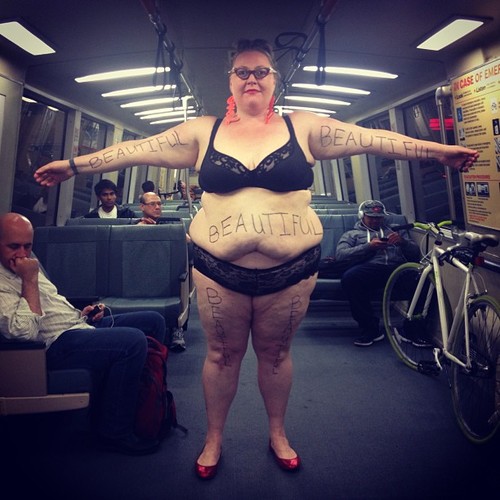 The final photo in the Be Beautiful series. Photo by Airial Clark.
The final photo in the Be Beautiful series. Photo by Airial Clark.
When you were younger did you have a period of self-hate? If so how did that affect you internally and in the ways you expressed yourself or interacted with others?
Truthfully I hated myself most days until I did the Be Beautiful project. That was not even two years ago and I am currently 35 years old. I fear saying this but in the spirit of honoring vulnerability there are still so many days self-hatred creeps in like a destructive lover. The hatred no longer wins but it sure does work hard to hold its place in my life.
Throughout my teens and most of my 20’s I aspired to be loved by everyone. So I showed up in service to the needs of those around me rather than working to actualize my own greatness. I was sweet and congenial. Hell I was even prom queen. I was simultaneously highly visible while feeling completely invisible and alone. No one knew much of anything about my life and if they did it was compartmentalized to a singular aspect and
never the full spectrum.
What helped you decide not to hate yourself? What were the circumstances, how old were you?
A want for love was my primary motivation. I was constantly in shared space with my Bestie and platonic life partner Sonya Renee Taylor who founded The Body is Not an Apology. Her life’s work is about creating social change through empowering radical self-love and acceptance. She and I were invited to be part of a Body Politic think tank at Yerba Buena Center for the Arts in San Francisco and asked the question “What sits on the other side of your bodies shame and your bodies joy?” I was 33 and had never really experienced being seen as desirable, partnerable, or lovable. I realized I had never shared sexy photos with a lover or even stopped to look at my gorgeous body in the mirror. I had no clue I was sexy or amazing. I knew part of that was something I had to navigate internally but was also clear there were social constructs that instilled those beliefs in me so I started Be Beautiful as an active inquiry to the question and now my life’s completely different.
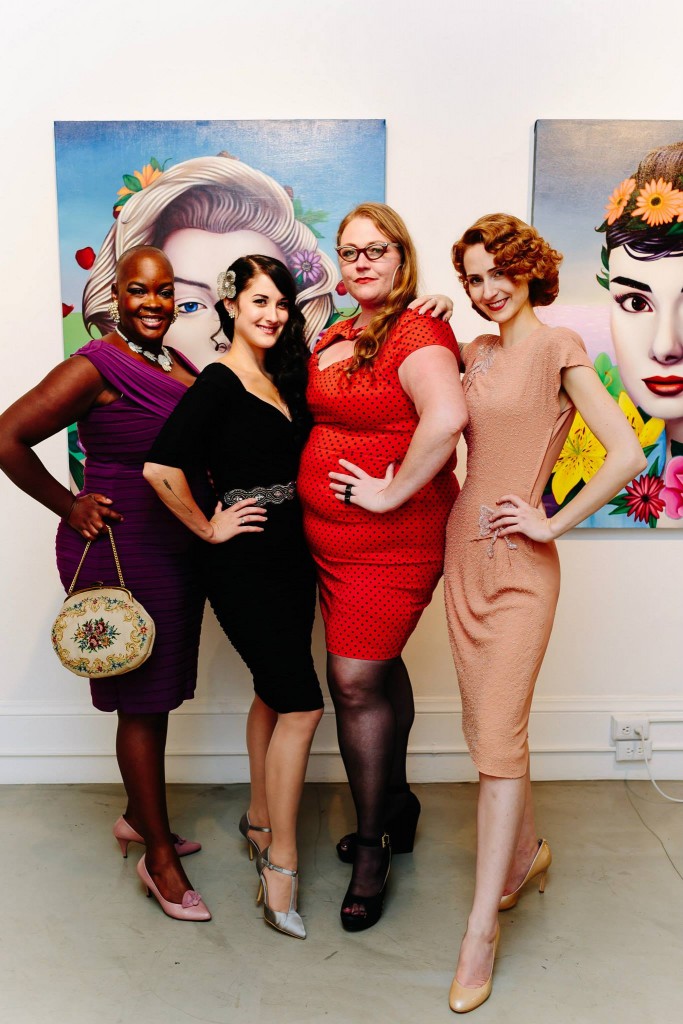 (L-R) Sonya Renee Taylor, Shameless SF photographer Carrie Lynn, Denise, and Shameless founder and photographer Sophie Spinelle. Photo by Miki Vargas.
(L-R) Sonya Renee Taylor, Shameless SF photographer Carrie Lynn, Denise, and Shameless founder and photographer Sophie Spinelle. Photo by Miki Vargas.
Where has your journey to living a life geared towards self-love taken you? How has your work as an artist been influenced by this journey?
It has become my life’s work. Outwardly my journey toward self-love has literally taken me all over the world. Honoring the vulnerability through public discourse and artistic process has afforded me the opportunity to speak, perform, and share my work with audiences globally. I am now a fulltime artist and activist who’s work specifically engages the process of actively learning to love myself. My goodness, as a working class girl who was told she’d never be nothing I still weep with gratitude at what my life has become.
Inwardly my journey towards self-love has taken me through a tumultuous and impassioned series of love affairs. I have and continue to build intimacy while dismantling the internalized beliefs that lead me to 33 years in isolation from love. I had never known beauty, body and heart break the way I do now. As a writer I live a life that lends to a shifting narrative. Which means everything I do informs my artistic practice.
Your Be Beautiful project was a huge step towards leaning into self love. Can you give some background to my readers who are unfamiliar with the project and the reception?
Be Beautiful started as a 30 day exploration into loving my 6 ft tall 311lb body. Each day I took a photograph of myself nearly naked in public and private spaces with beautiful written across the parts of my body I had internalized shame about. I then posted the images on social media. When the 30 days were complete I wrote an article about my journey that was published on The Body is Not an Apology. The Article and photographs have since been republished and cross-posted all over the world. I then had the remarkable privilege of working with Shameless photography. We flew to Brooklyn and recreated the shot of Madonna hitchhiking nude only this time I was the model wearing only high heals and a handbag. Mind blowingly that image went more viral than the Be Beautiful series. For instance in a single day it was shared with Cosmopolitan.com, Redbook, and MTV under headlines naming my 311lb body as gorgeous.
Having major markets and social institutions like Cosmo name a body like mine as gorgeous was a remarkable moment. That said what I continue to experience, as most impacting are the personal stories people share. Last year on tour a young woman told me when the project was released she was in treatment for an eating disorder and the project saved her life. So many women have written just to tell me in seeing my body they are considering themselves as beautiful for the first time in their life. My god that’s amazing.
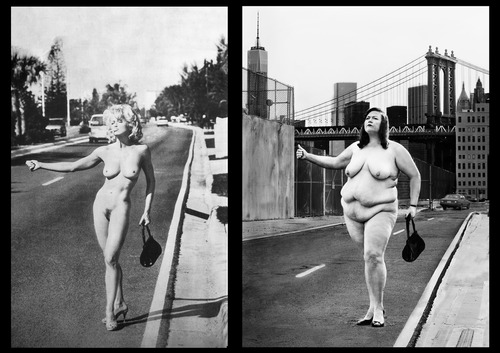 The recreated Madonna shot (my first missed connection with Denise–Sophie invited me to the set to help this last March but Dara had chemo that day!), photo by Shameless Photography.
The recreated Madonna shot (my first missed connection with Denise–Sophie invited me to the set to help this last March but Dara had chemo that day!), photo by Shameless Photography.
Since the Be Beautiful project ended have you continued the practice of looking in the mirror at your body? How has your conception of your body changed?
I most definitely have continued the practice of looking at myself in the mirror! There of course have been periods wherein I have not but I do
prioritize doing so.
I love my body now. Every inch, every stretch mark, my face, my breasts, my ass, I love it! The most important evolution has been learning to share and celebrate my body with lovers.
Is there anything you think you could say to your younger self to turn away from self hatred or do you think it was an inevitable path that had to run its course?
To be real I think our cultural constructs around self hatred and destruction lend to most people having to navigate and work through some level of it. That said I certainly believe it can lessen with every generation.
The biggest piece of advice I can offer is to surround yourself with people who affirm and validate your power and possibility. Regardless of age or station that can be hard but if you identify potential role models that challenge any perception of internalized shame or self-hatred, invest in that relationship. I have been blessed to meet a slew of powerful women in my life and have worked very hard to prioritize being in shared space with them as much as possible. My closest friends are my greatest influences and anyone I work in collaboration with or support of is someone that is investing in the actualization of my greatness as much as they are of their own. This is imperative.
What practices do you employ now to be more self loving and less self hating?
I have many. I think the most important is practicing active awareness. Self-hatred did not just disappear when self-love finally made its way into my life. When hatred comes I have to honor its arrival, unpack why its here, and invite the possibility of other experiences. This opens my life up to moments of levity without shaming the absolute truth that I was indoctrinated with a deep belief that I should hate and work to destroy myself and everyone else.
I wrote an article that offers 5 rules to start being beautiful that I think can speak more extensively to this.
What’s your favorite self-care activity?
My favorite activity is writing love poems in chalk while listening to music and dancing around my neighborhood in the middle of the night.
Thank you so much, Denise, for your thoughtful and incredibly powerful answers for the Half the Self Hate series!! You can invite Denise Jolly to speak, teach or perform! All the information is at her website. You can also follow Denise on her Instagram, Facebook fan page and Tumblr!
******************
Half the Self Hate Instagram and Twitter contest challenge:
The contest is over, thanks to the folks who shared and posted, and many many thanks to two great feminist, queer owned, body positive sex toy stores for sponsoring, Sugar in Baltimore, MD and Self Serve Toys a queer-owned feminist sex toy shop in Albuquerque, NM (both have online stores). They believe, as I do, that all bodies are worthy of love exactly as they are!
I still want to know how you’ve lost half your self hate! Write a tweet or an Instagram post about one practice you have employed to lose half your self hate. Or commit to employing one practice to lose half your self hate! (You can borrow a practice you learned about in this blog series!) Hashtag your post with #halftheselfhate.
I can read something and it kinda sinks in, but if I read something and then apply it to my life by writing something reflective, that’s when it really begins to work for me. The great thing about blogs and social media is the archive. I’ve really loved reading what people have said so far on the hashtag and I’d love for it to continue as a reflective space for folks to remember what they’ve done to cut half their self hate! It’s difficult to speak openly about loving yourself and I’d love to keep moving forward to cut that social stigma!

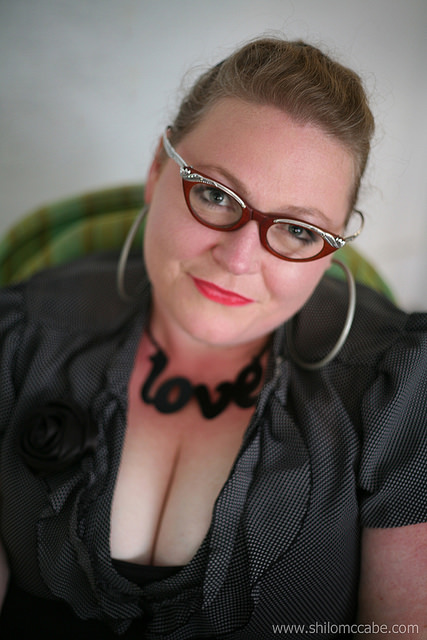
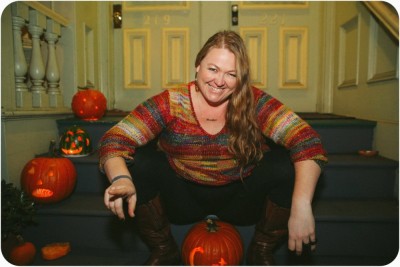
Dear Bevin, Thank you, thank you, thank you! – for introducing me to Denise Jolly’s work. So much in her interview resonated, so I started following the links (thanks for making it easy for me!) and … wow! I really needed to hear these particular messages right at this moment in my life, especially “Live as though your body was built for joy because it was, is and will always be.” 🙂
As always, thank you!